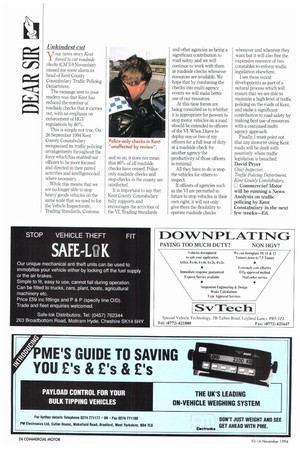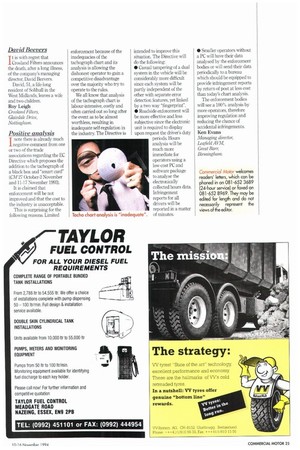Vour news story Kent I. forced to cut roadside checks
Page 26

Page 27

If you've noticed an error in this article please click here to report it so we can fix it.
(CM 3-9 November) caused me some alarm as head of Kent County Constabulary Traffic Policing Department.
The message sent to your readers was that Kent has reduced the number of roadside checks that it carries out, with an emphasis on enforcement of HGV regulations by 80%.
This is simply not true. On 26 September 1994 Kent County Constabulary reorganised its traffic policing arrangements throughout the force which has enabled our officers to be more focused and directed in their patrol activities and intelligence-led where necessary While this means that we are no longer able to stop heavy goods vehicles on the same scale that we used to for the Vehicle Inspectorate, Trading Standards, Customs and so on, it does not mean that 80% of all roadside checks have ceased. Policeonly roadside checks and stop-checks in the county are unaffected.
It is important to say that Kent County Constabulary fully supports and encourages the activities of the VI, Trading Standards and other agencies as being a significant contribution to road safety and we will continue to work with them at roadside checks whenever resources are available. We hope that by combining the checks into multi-agency events we will make better use of our resources.
At this time forces are being consulted as to whether it is appropriate for powers to stop motor vehicles on a road should be extended to officers of the VI. When I have to deploy one or two of my officers for a full tour of duty at a roadside check for another agency the productivity of those officers is minimal.
All they have to do is stop the vehicles for others to inspect If officers of agencies such as the VI are permitted in future to stop vehicles in their own right, it will not only give them the flexibility to operate roadside checks whenever and wherever they want but it will also free the expensive resource of two constables to enforce traffic legislation elsewhere.
I see these recent developments as part of a natural process which will ensure that we are able to maintain a high level of traffic policing on the roads of Kent, and make a significant contribution to road safety by making best use of resources with a continued multiagency approach.
Finally, I must point out that any motorist using Kent roads will be dealt with positively where traffic legislation is breached. David Pryer Chief Inspector,
Traffic Policing Department, Kent County Constabulary D Commercial Motor will be running a News Analysis on traffic policing by Kent Constabulary in the next few weeks—Ed. It is with regret that Crosland Filters announces the death, after a long illness, of the company's managing director, David Beevers.
David, 51, a life-long resident of Solihull in the West Midlands, leaves a wife and two children.
Roy Leigh
Crosland Filters, Glaisdale Drive, Nottingham.
Positive analysis
T note there is already much 'negative comment from one or two of the trade associations regarding the EC Directive which proposes the addition to the tachograph of a black box and "smart card" (CM 27 October-2 November and 11-17 November 1993).
It is claimed that enforcement will be not improved and that the cost to the industry is unacceptable.
This is surprising for the following reasons. Limited enforcement because of the inadequacies of the tachograph chart and its analysis is allowing the dishonest operator to gain a competitive disadvantage over the majority who try to operate to the rules.
We all know that analysis of the tachograph chart is labour-intensive, costly and often carried out so long after the event as to be almost worthless, resulting in inadequate self-regulation in the industry. The Directive is intended to improve this situation. The Directive will do the following: • Casual tampering of a dual system in the vehicle will be considerably more difficult since each system will be partly independent of the other with separate error detection features, yet linked by a two way "fingerprint".
• Roadside enforcement will be more effective and less subjective since the electronic unit is required to display upon request the driver's duty periods. Hours analysis will be much more immediate for operators using a low-cost PC and software package to analyse the electronically collected hours data. Infringement reports for all drivers will be reported in a matter of minutes. • Smaller operators without a PC will have their data analysed by the enforcement bodies or will send their data periodically to a bureau which should be equipped to provide infringement reports by return of post at less cost than today's chart analysis.
The enforcement bodies will see a 100% analysis by more operators, therefore improving regulation and reducing the chance of accidental infringements. Ken Evans Managing director, Leafield AVM, Great Barr, Birmingham.








































































































